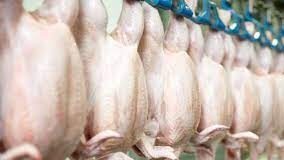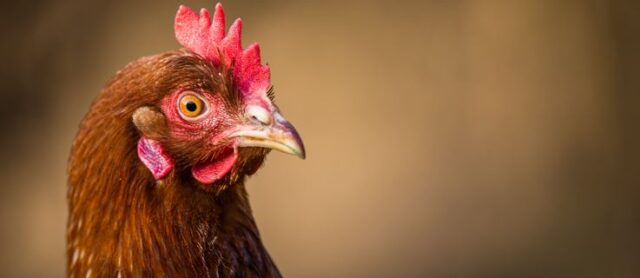
Heat stress is one of the most important environmental stressors challenging poultry production worldwide. It results from a negative balance between the net amount of energy flowing from the bird’s body to its surrounding environment and the amount of heat energy produced by the bird.
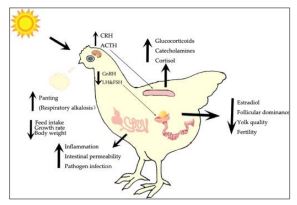
In this condition, there is markedly reduction in growth, reproductive performance, and egg production in poultry birds. Sometimes due to heat stress there is higher mortality seen.
Economic impact of heat Stress
Due to heat stress, there is a serious loss in growth, production & performance. In a recent study, broilers subjected to chronic heat stress had significantly reduced feed intake (16.4%), lower body weight (32.6%), and higher feed conversion ratio (+25.6%) at 42 days of age.
In layers a 12-day heat stress period caused a daily feed intake reduction of 28.58 g/bird, resulting in a 28.8% decrease in egg production, 31.6% reduction in feed conversion rate, egg quality may also decreases.
Temperature & Humidity Relationship: Heat Index Chart
Temperature
The thermoneutral zone is the range of environmental temperatures that an organism can maintain their body temperature. For most poultry, the thermoneutral zone is between 60 and 75 F.
Humidity
High humidity decreases poultry heat loss from the lungs, which makes the birds more prone to heat stress.

Biosynthesis of Vitamin C in Poultry
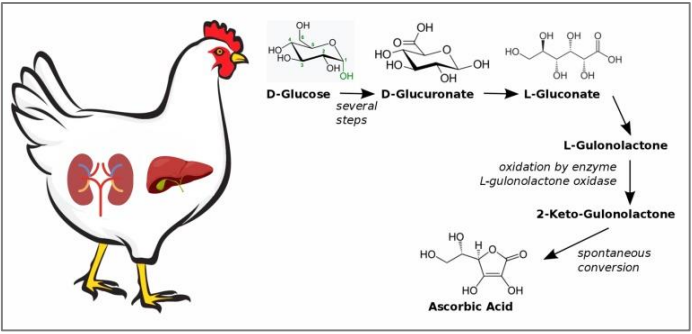
Poultry birds have the capacity of synthesized Vitamin C in the liver & kidneys in the presence of L-gulonolactone oxidase enzyme. The amount of vitamin C produce depends upon sex, age & physical status, during heat stress biosynthesis of vitamin C is affected due to oxidative stress on the liver & kidneys, thus the endogenous supply of vitamin C does not fulfil the requirements to fight against the heat stress. Natural replacer is the ability to fulfil the requirements because they activate the biosynthesis of vitamin C by mimicry effect as L-gulonolactone oxidase enzymes& also supports liver & kidney functions.
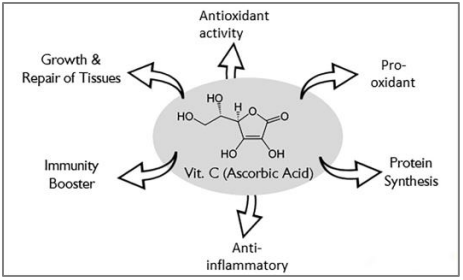
Role of Vitamin C during HEAT STRESS
Protects cells from oxidative damage due to heat stress.
Repair cells & tissues damages during heat stress conditions.
Prevents immunosuppression due to heat stress.
Protects gut cells from inflammation & prevents summer enteritis.
Strengthen the body’s ability to fight against heat stress.
Provide energy reduces mortality & improves egg & meat quality.
Supremacy of Natural Vitamin C over Synthetic Sources
| Natural Vitamin C | Synthetic Vitamin C |
| Highly Stable Higher bioavailability Does not affected by the gut environment Fulfil the requirements Supports vitamin C biosynthesis | Less stable Poor bioavailability Deteriorated by gastric juices Does not fulfil bodies requirements No effect on the biosynthesis of vitamin C |
Prevention Strategies
Housing Management
- Control temperature by the insulated roof, proper ventilation, Fogging/spraying
- Regular Humidity monitoring, Use of fan & exhauster
- Proper lighting schedule
Stocking density
Overcrowding should be avoided & maintain the optimum space required for birds.
Watering
- Cool water supply, overhead tanks & pipe system should be covered to keep cool water during the noon
- Adding electrolytes to drinking water
- Increase the number of drinkers
Feeding
- Avoid feeding at a hot time, one-third of the daily ration should be given in the morning & two-thirds in the late afternoon
- Balanced & digestible feed should be given, using feed pellet instead of mash feed
- Supplementing vitamins & minerals prior to summer start, especially Vitamin C which is having the capability to protect birds from heat stress.
Also, read…
Strategies to Combat Heat Stress in Poultry

Dr. Gopal Barapatre
Asst. Product Manager,
Biozene, India
















